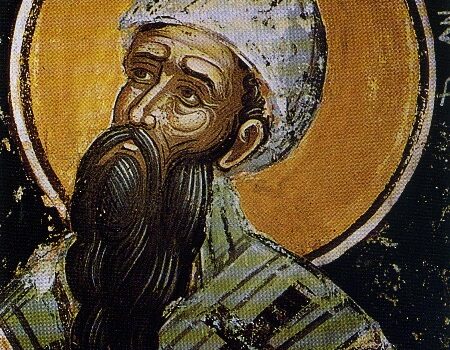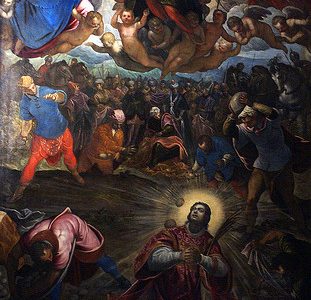
 St. Cyril of Alexandria (376?-444) was a very strong-willed and controversial bishop and theologian. He was the nephew of the Bishop of Alexandria in Egypt (an important religious center), and in 412 he succeeded his uncle in this position. The early part of Cyril’s episcopacy was impulsive and often violent; in his zeal for orthodoxy Cyril closed the churches of schismatics, drove Jews out of the city and confiscated their property, quarreled with the imperial prefect, and antagonized local monastic groups.
St. Cyril of Alexandria (376?-444) was a very strong-willed and controversial bishop and theologian. He was the nephew of the Bishop of Alexandria in Egypt (an important religious center), and in 412 he succeeded his uncle in this position. The early part of Cyril’s episcopacy was impulsive and often violent; in his zeal for orthodoxy Cyril closed the churches of schismatics, drove Jews out of the city and confiscated their property, quarreled with the imperial prefect, and antagonized local monastic groups.
However, Cyril gradually learned to control his volatile but well-meaning temper, and as he modified his abrupt ways, he provided important leadership to the Church, particularly during the Nestorian controversy. The heretical teaching of Nestorianism claimed that Mary is not the Mother of God, but only the Mother of Christ.
At the Council of Ephesus in 431, Cyril presided as the pope’s representative; Nestorianism was condemned, and — because Jesus is equally God and man — Mary was solemnly declared to be the Mother of God. St. Cyril died in 444; he is best known for his many writings on scripture and theology, and it was in recognition of these that Pope Leo XIII in 1882 declared him to be a Doctor (an eminent and reliable teacher) of the Church.
Lessons
1. Even persons with great faults or weaknesses — such as a fierce temper — are called to holiness. St. Cyril had to change his harsh and overly-zealous style; once he did so, with the help of divine grace, he became a worthy and valuable servant of God and the Church.
2. Cyril recognized that honoring Mary is also a way of honoring her Son, and claiming Mary as the Mother of God acknowledges Jesus’ divinity; this insight has always been preserved by the Church.
Other Saints We Remember Today
Our Lady of Perpetual Help (13th Century)
St. Ladislaus (1095), King of Hungary
image: Wikimedia Commons













